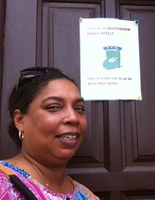You can watch video from a speaking engagement at MindFreedom Lane County by two African American psychiatric survivor leaders.
Celia Brown, MFI Board President from New York City, spoke in Eugene, Oregon.
You can watch Youtube videos by Hugh Massengill of these two speakers here:
by LaTonya Gibbs
While it may have gone by without much note, I feel the little talk that happened at the Eugene Public Library on 15 October 2012 was enormously encouraging. We had two forces of nature grace us with their energy and wisdom.
Peer support pioneer, psychiatric survivor, and MindFreedom board president, Celia Brown joined us from the East Coast to share her story. She made her way down from Portland after attending the Alternatives conference, a gathering of consumers/survivors that happens each year. It was great to have Celia finally meet with us at the Eugene, Oregon offices of MindFreedom International for the first time before speaking at our wonderful library. She shared the microphone with another East Coast advocate, Jacki McKinney, a social worker who focuses on the mental health of minority and marginalized people. She was on this coast for a short time also attending the Alternatives conference.
As African-American women from urban areas, it’s sad that it wasn’t likely a surprise to those who listened that both have had their hardships. Both have survived abuses of varying sorts. What might have come as a surprise was how both have not only survived but thrived.
Celia entered the psychiatric system as a teen and experienced trauma and abuse from those charged with her healing. She came through her experiences and became a singular mover in the implementation of peer support as an option outside the medical model in New York City. She’s also the current president of the MFI Board of Directors.
Jacki McKinney, an amazing survivor of addiction, trauma, and homelessness shared a lot of clarity with her fresh, knowing candor. She now makes her home in Philadelphia. Despite her past experiences with both the psychiatric and criminal justice system, Jacki persevered and, like Celia, transcended what was expected of her. She rose above her challenges and went on to get a Masters Degree in Social Work.
Both these ladies shared their views on how providers could be more inclusive in their treatment models and how they could make those treatments spaces safer for those who’ve experienced trauma. Celia shared her experiences and how creating a network of help for others actually helped her make strides in her own healing. Jacki specifically focused on ways to make the option of counseling and self-care more appealing to minorities, those who have experienced trauma in any form, marginalized folks, and those who are oppressed. It was certainly a rare and wonderful thing to have these two luminaries in the same place, doubling the sharing of information and experience for both providers and those who are in crisis and need care.
Document Actions


